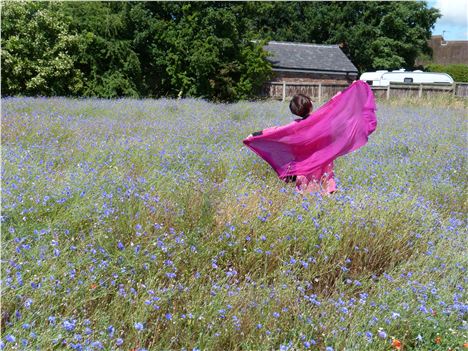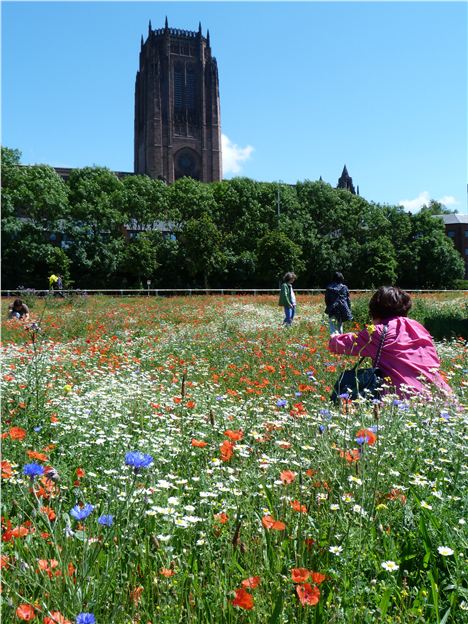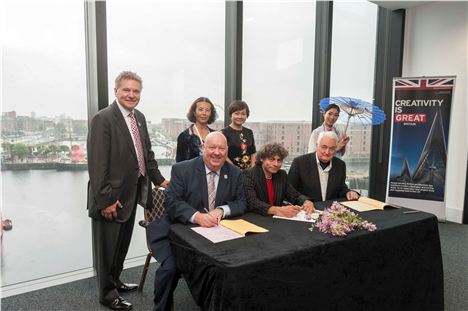KNOWSLEY'S National Wildflower Centre is known far and wide for its cultivation of all those things, bright and beautiful, which you will never find in a Dobbies. Now it is scattering seeds even further - 10,000 miles away in China.
It's a groundbreaking project, in every sense, that forges new links between Liverpool and China. The cultural and conservation partnership was cemented at Mann Island at the weekend with a special signing ceremony in Chinese, as part of the International Festival for Business.
Supported by the Department of Trade and Industry, the Liverpool-China partnership "will create a new reciprocal wildflower seed industry and generate creative conservation projects in China", it says here.
To translate: there are millions of wildflower seeds lying dormant in special banks in China, and thanks to the new tie-up with Landlife, the charity behind the National Wildflower Centre, work has begun to sow them in areas of urban blight there.
Where there is ugly concrete now will bow the flamboyant heads of poppies and rosebay willowherbs.
Richard Scott, Landlife's senior project manager, said: “Landife has pioneered creative conservation for 40 years, using innovative techniques to establish new wildflower landscapes for the benefit of wildlife and people. This agreement is an important step for us, and it is fitting that Liverpool, with the oldest Chinese community in Europe and a pioneer of ecological restoration, should be focus for this event.
“This is a very exciting beginning for the beginning of a Chinese wildflower seed industry, and shows China's commitment to combat environmental degradation by using wildflowers on urban restoration projects in the same way groups like ourselves have pioneered this practice in the UK."
 This sort of thing, but in China: Mrs Zhou from Chengdu in a Landlife cornflower Field in Kirkby
This sort of thing, but in China: Mrs Zhou from Chengdu in a Landlife cornflower Field in Kirkby
The Chinese Community in Liverpool is the oldest in Europe, and earlier this year Landlife helped representatives and local schoolchildren plant poppy seeds on the Tribeca land below the Anglican Cathedral with permission from Liverpool City Council and support from John Swire and Sons Ltd, a global company with Liverpool roots which has extensive Chinese business interest.
The poppies germinated in time for the signing ceremony on Friday, with the bright red colour symbolising good fortune and joy in Chinese culture.
Scott added: “National and international seed banks are important. However, it is also important that seeds are put to effective and reviving use, as part of a living landscape. We hope projects like this will eventually create the cities of the future, which reflect biodiversity and a real concern for the planet and wild flowers.”
The seeds of the project were sown in 2008 when Professor Wang from Shanghai visited Liverpool for Capital of Culture year. The National Wildflower Centre and its work left a big impression and upon his return he was eager to spread the word. Links with Kunming Botanic Institute developed after a visit from Jie Cai, then Kew Gardens’ China Programmes Officer, who came to speak to Liverpool's Chinese community at the Pagoda Centre in 2007, sparking the connection to Kunming.
 Listen, to what the flower people say...
Listen, to what the flower people say...
Friday's signing event was hosted by Mayor Joe Anderson and attended by representatives from Landlife, Sichuan Rungfeng Landscape Engineering Ltd, the Kunming Institute of Botany and UKTI North West.
Celebrations were completed with a visit to the poppy fields on Upper Duke Street, a performance of the Chinese Children¹s Youth Orchestra and refreshments at the Pagoda Centre on Henry Street.
The agreement was first signed in English at the opening ceremony of British Week in Kunming in April, and coincided with Landlife's trip to China to research and refine selection of Chinese wildflower species for multiplication."
 Landlife signing celebrations at IFB HUB Liverpool: Liverpool Mayor Joe Anderson, with UKTI Regional Director Clive Drinkwater, Richard Scott,(centre) Sir Adrian Swire, Hon. President of John Swire and Sons, with Dr. Yang (back left) and Mrs.Zhou from Kunming, south west China
Landlife signing celebrations at IFB HUB Liverpool: Liverpool Mayor Joe Anderson, with UKTI Regional Director Clive Drinkwater, Richard Scott,(centre) Sir Adrian Swire, Hon. President of John Swire and Sons, with Dr. Yang (back left) and Mrs.Zhou from Kunming, south west China










